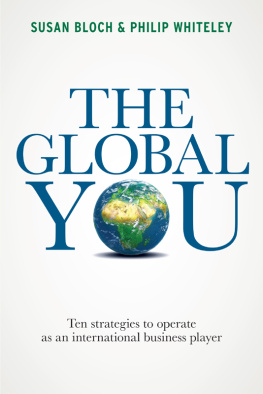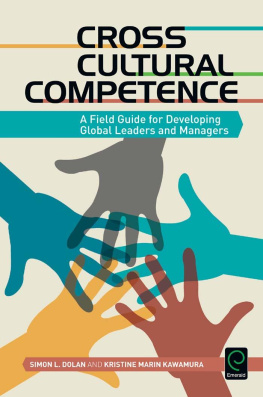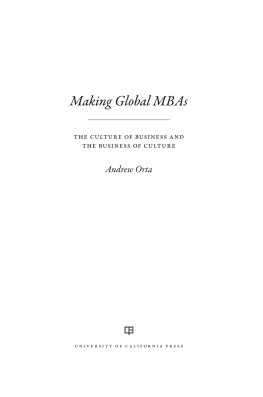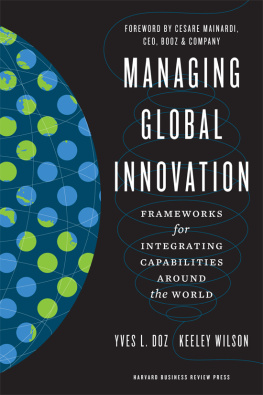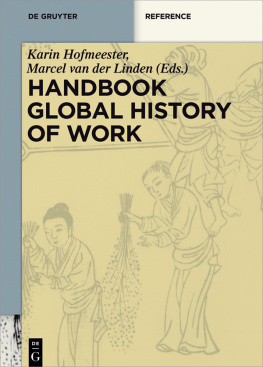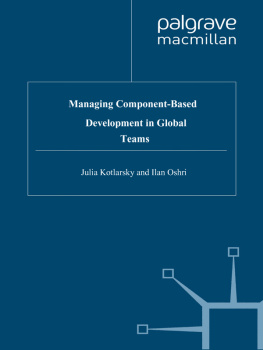Praise for THE GLOBAL YOU
If you are looking for a strategic, insightful and, most importantly, practical guide for preparing yourself to succeed in the global marketplace, relax, youve found it!
Dick Snyder, president and COO of ACO Inc, USA
The fact that these ten strategies are based on research from global managers themselves builds a very solid foundation for the insights and practical advice offered in this book. Every manager has something worthwhile to learn in this study.
Peter Hogarth, partner in JCA Coaching LLP, London
An invaluable guide to the Global Village.
Jeffrey Geri, author of Culture Smart Israel
Embedding these ten practical strategies in your life will sustain your competitive edge in the global market.
Olga Hafner, board director of
Meridian Wine Merchants, South Africa
Susan Bloch and Philip Whiteley have done a remarkable job of assembling a set of strategies for preparing managers for the increasingly global organization and marketplace. The book is very thoughtful and very practical at the same time. The strategies suggested will be useful not just for building a global mindset but also for increasing managerial adaptability and mental flexibility in general. Indeed I would recommend the book for all managers, not just those assigned to global roles; for the latter I would say: Dont leave home without it.
Gautam Ahuja, Harvey C. Fruehauf Professor of
Business Administration, Professor of Strategy,
and Chair of Strategy at the University of Michigan
I found Susan Bloch and Philip Whiteleys first book, How to Manage in a Flat World, a very perceptive insight into managing a distributed organisation. Their latest, The Global You, provides a practical and focused follow-up for individuals learning how to cope with global change. As our business goes ever more global, I know members of our team will find its succinct advice hugely useful.
John Lazar, chairman of
Metaswitch Networks, UK/USA
The Global You gives a compelling view of globalization and what it takes to perfect borderless working. Its brilliant in the way it forces us to look at our worldview and start thinking globally. A must-read for all who wish to succeed in todays highly networked world.
Girish S. Paranjpe, co-CEO of Wipro IT Business and
member of Wipro Ltd board of directors, India
The Global You is very much the practitioners guide to coming to grips and effectively dealing with a global business worldproviding a solid foundation and actionable framework for ones journey.
Shai Weiss, founding partner of
The Virgin Green Fund, UK
This book is a must-read for anyone who wants to operate as an international player. It provides an excellent road map, with insights and strategies, as well as helpful exercises.
Shaun Higgins, retired president of
Coca-Cola Enterprises Europe
Copyright 2011 Susan Bloch and Philip Whiteley
First published in 2011 by Marshall Cavendish Business An imprint of Marshall Cavendish International
PO Box 65829
London EC1P 1NY
United Kingdom
and
1 New Industrial Road
Singapore 536196
www.marshallcavendish.com/genref
Marshall Cavendish is a trademark of Times Publishing Limited
Other Marshall Cavendish offices:
Marshall Cavendish International (Asia) Private Limited, 1 New Industrial Road, Singapore 536196 Marshall Cavendish Corporation. 99 White Plains Road, Tarrytown NY 105919001, USA Marshall Cavendish International (Thailand) Co Ltd. 253 Asoke, 12th Floor, Sukhumvit 21 Road, Klongtoey Nua, Wattana, Bangkok 10110, Thailand Marshall Cavendish (Malaysia) Sdn Bhd, Times Subang, Lot 46, Subang Hi-Tech Industrial Park, Batu Tiga, 40000 Shah Alam, Selangor Darul Ehsan, Malaysia
The right of Susan Bloch and Philip Whiteley to be identified as the authors of this work has been asserted by them in accordance with the Copyright, Designs and Patents Act 1988.
All rights reserved
No part of this publication may be reproduced, stored in a retrieval system or transmitted, in any form or by any means, electronic, mechanical, photocopying, recording or otherwise, without the prior permission of the copyright owner. Requests for permission should be addressed to the publisher.
The authors and publisher have used their best efforts in preparing this book and disclaim liability arising directly and indirectly from the use and application of this book. All reasonable efforts have been made to obtain necessary copyright permissions. Any omissions or errors are unintentional and will, if brought to the attention of the publisher, be corrected in future printings.
A CIP record for this book is available from the British Library
eISBN 978-981-4346-12-2
Cover design by OpalWorks Co. Ltd
Printed and bound in the United Kingdom by CPI William Clowes

To the current as well as future Global Managers
who will bring economic stability, build cultural bridges,
and ensure peace for us all
CONTENTS
THE TEN STRATEGIES
INTRODUCTION: WORKING IN THE BORDERLESS WORLD
When some of the worlds largest financial institutions hit crisis in 2008, it was primarily national governments that rescued them. The governments used taxpayers money to save their banks or their insurance companieseven when, as in the case of The Royal Bank of Scotland or AIG, the companys interests stretched right across the world.
Does this mean that for all the talk of a borderless world, globalization is only skin-deep, and that we still really live in a world of nation-states?
Your country is evidently still a powerful entity. It determines your passport, the language you speak, your right to work in specific parts of the world, and the taxes you pay. It may require you to engage in military service as well. In some countries, you even rely on it for health care and for an income in retirement. At an institutional level, then, the nation stands tall and proud as an influential player. Think of what soccer, cricket, or the Olympic Games do to national prideor shame.
Yet, the nation-state is not dominant in all fields. Even in the example of the banking rescues, international groupings such as G8 and G20 are keen to set up international arrangements to prevent a recurrence of the crisis of 2008. Whether they will be able to move far enough, quickly enough, is a key test. The credit crisis gave finance ministers and prime ministers the fright of their lives; many are conscious that international companies in the private sector may one day generate liabilities that are beyond the scope of even the richest government to cope with. Given the level of indebtedness of many countries, the fate that befell Icelandbankrupted by its international bankscould affect other, larger countries. Greece is still struggling for support from Germany and the European Union. Regulation and contingency planning are moving to the international sphere.
And in other sectors, the economic recession and crisis propelled greater, not less, international fusion. Airlines, for example, used to be characterized by flag-carriersstandard-bearers for the nation-states. The term is now an anachronism, as flag-carriers seek safety through mergers. British Airways and Spains Iberia airline confirmed their tie-up in April 2010, in a culturally similar match to the take-over of the Abbey bank by Santander some years earlier. This is not only happening for airlines. In car manufacturing, Geelys purchase of Volvo means that the Chinese and Swedes will be working closely together, while in steel production, Tatas purchase of Corus will give the Indians, Dutch and British the same opportunity. Of course, there are countless other examples.
Next page
